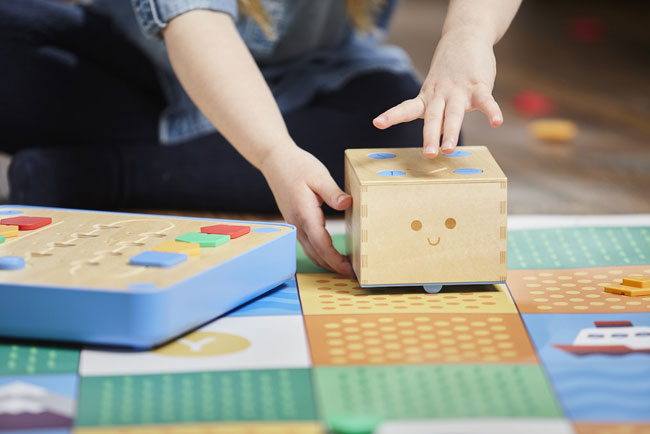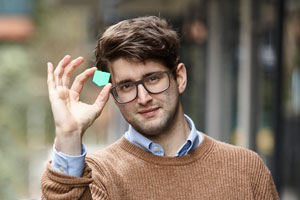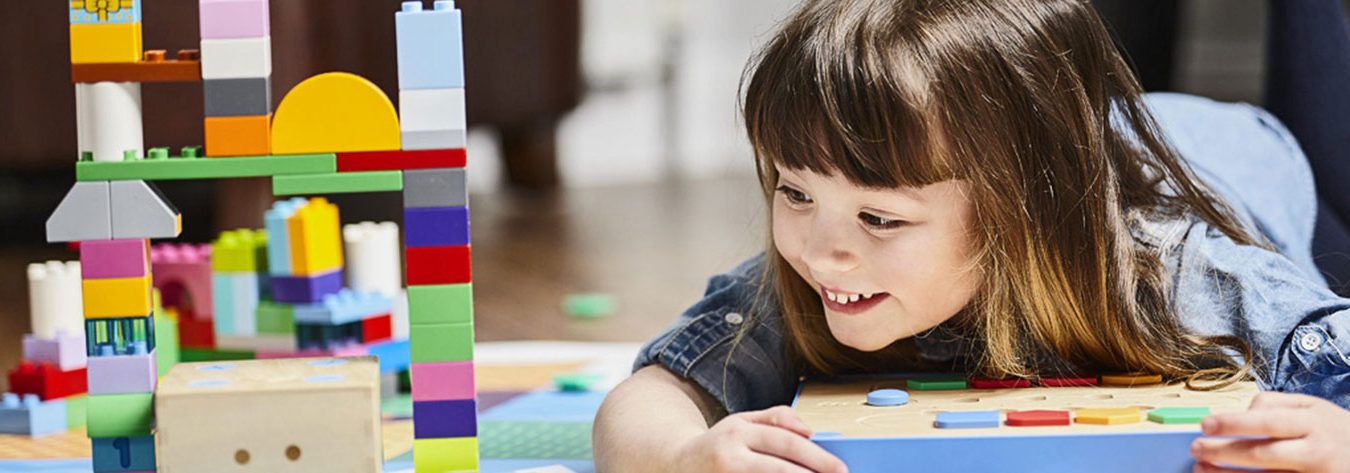
Cubetto allows children to learn coding without a screen.
The Cubetto play set, a ground-breaking new computer programming toy designed, built and sold by London-based Primo Toys, was launched online in the UK in November 2016. It has since been snapped up by more than 20,000 nurseries, playgroups and after-school coding clubs from Aberdeen to Australia.
The smiling cuboid robot will be available in retail stores worldwide later this year, but Japanese shoppers were the first to be able to pick the little wooden computer up off the shelf and wonder just how it would give their child a head start in a field that has become one of the 21st century’s professional buzzwords—coding.
The founder of Primo Toys, Filippo Yacob, a zealous enthusiast for the quality of his product, wanted to wait for a retailer that reflected Cubetto’s value. “We’re very excited to be in Isetan”, he said. “I think that their commitment to quality is a good fit for what we do”.
First steps
Cubetto is a wooden cube that teaches three-year-olds and over to code without using a screen. The cube, adorned with a smiley face, conceals a customised computer that connects via Bluetooth to a wooden interface board.
Children control Cubetto’s movements by slotting colourful blocks into the interface board, thereby creating basic algorithms and programs.
Each shaped block represents a specific command for Cubetto—move left, right, forward or backwards. A separate function block acts as a shortcut command for a longer sequence of movements laid out in another part of the board—more than 50tn combinations are possible. In this way, Cubetto progresses around a story-telling mat that depicts enticing destinations and adventures, but play is also open-ended.
The system is tactile and can be operated by blind children. The process is also intuitive and non-verbal, so the robot has cross-border cultural appeal.
Inclusivity was a design priority. For example, the line into which the blocks are slotted is S-shaped, “because left to right is a pattern that you learn later in literacy”, said Yacob. “In Japan you would go top to bottom, in the Middle East you would go right to left”.

At nearly ¥30,000, Cubetto is an investment. It’s designed to appeal to both parents and children, because, in Yacob’s words, it “looks and feels like a toy”, but is in fact “a scalable, procedural programming language”. The coding blocks are a physical version of Logo, an educational programming language invented in the 1960s at the Massachusetts Institute of Technology, and still the basis of educational coding today.
And while it may be natural for today’s digital natives to learn to code, the gadgets they are so familiar with are really designed for adults.
“My son was born with an iPad in his hand”, said Yacob. But he felt that the “slick screen” of the tablet was more of an addictive distraction for young children than a genuine learning tool.
Even before his son’s birth, Yacob, a designer by trade, was researching ways to teach computational thinking—the ability to plot a sequence of logical commands—to pre-literate children. Existing methods of teaching coding are largely aimed at older children and rely primarily on screen-based games that require a degree of abstraction, conceptual thought and literacy.
Yacob felt that this missed a crucial opportunity. He believed that the natural play-based learning of the youngest children, which relies on constant repetition of tactile, trial-and-error challenges such as block-stacking and jigsaw puzzles, was in its own way a form of basic computational logic. He decided to create a computing toy that would harness this natural drive to learn through self-correcting practical experimentation, and without the need for a screen.
After extensive research and testing, the eventual result was the first prototype of the Cubetto, which he and his design partner and co-founder, Matteo Loglio, crowdfunded on Kickstarter in November 2013, the year coding was made mandatory in UK primary schools. Yacob’s son, Alex, was born the day they launched the campaign. “I figured I’d make one for myself and it’d be ready for my son when he came along”, said Yacob.
n the end, the campaign raised £50,000, and Yacob, Matteo and three colleagues made 800 units by hand. Some were sent “to schools, some to early customers, some to our backers. We turned ourselves into factory workers for an entire month, and my God, that was an incredibly stressful experience.
“But it got us to really understand our product. And then when orders started soaring after that, we were a lot more confident moving into mass production and figuring out how to make not 800, but 800,000”.
With a little help from Silicon Valley investors, including Mark Zuckerberg’s sister Randi, the former head of marketing at Facebook and now a campaigner for child-friendly technology, Yacob prepared to launch an improved version of Cubetto, again using crowdfunding. The second campaign, in March 2016, raised $1.6 million (£1.1mn), the highest-ever for an educational project in Kickstarter’s history.
“We were looking for maybe $100,000 in total—we got that within 24 hours, and three weeks later we were at over $1 million”, said Yacob. “It was really fast. And from that point on we’ve been a cash-positive growing business. Sales came from all over the world from that campaign and we found overseas business partners and distributors. Our turnover last year was just under $4 million”.
This year, they hit that figure by mid-February.

Filippo Yacob, founder of Primo Toys
Cubetto’s various next manifestations are already in “advanced development”, said Yacob. “We have more logic blocks, more maps, more stories, more adventures. Cubetto is going to visit a bunch of places, from jungles to caves to docklands to factories. Next year, he’s going to get a new friend, and they will go travelling together. We also want to explore topics like phonics and musical composition”.
The company now employs 16 staff at its London headquarters and operates in 96 countries. In manufacturing facilities in Shenzhen, China, 42 people build Cubettos as their full-time job. Primo is opening offices in South Korea, where they already have four staff members, “and we’re moving that way as well in Japan”.
Within three years, Primo Toys has grown from an idea to what Yacob calls “an industry challenger global toy company”.
“I always thought”, he said, “I’m going to build the best educational toy company in the world, one really amazing toy at a time”.
If Yacob is right, Japan will have been the first block in Cubetto’s journey across the world map.







